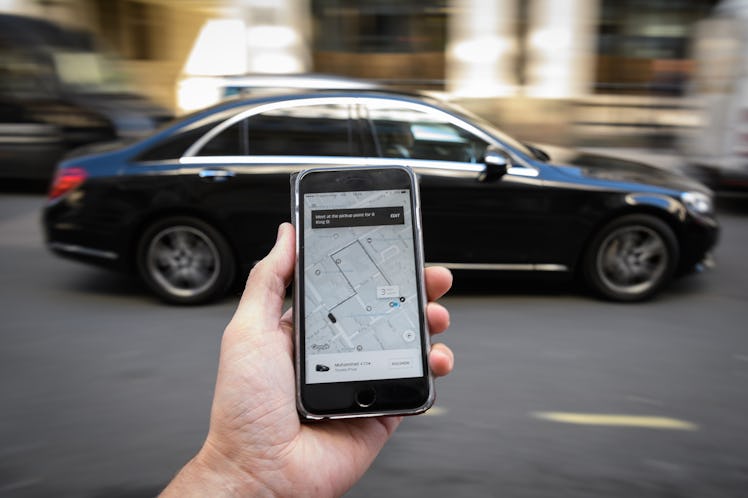
We’re Finally About To Get Flying Cars, & We Don’t Know How To Feel
If you're a die-hard fan of Harry Potter or pretty much any of the Back to the Future movies, it's very possible that, at some point, you've fantasized about hopping into one of those magical flying cars and zooming away. Well, it looks like those dreams might actually become a reality — official wizard license not required. Uber is introducing flying cars, and, honestly, the whole thing sounds a little terrifying.
During the Web Summit conference in Lisbon on Nov. 8, Uber chief product officer Jeff Holden announced that the ride sharing app will unveil flying cars by 2020. The service, dubbed UberAir, is set to debut in Dallas and Los Angeles. Holden speculates that they will see "heavy use" of the new product.
Uber won't build the four-passenger, electric flying cars themselves, but will rather partner with manufacturers, including civilian and military plane makers, jet manufacturers, and private plane makers. The company will also team up with NASA to create an air traffic control network that will monitor the busy sky. A property management company in L.A. is set to build Skyport rooftop take-off and landing terminals for UberAir.
"Technology will allow L.A. residents to literally fly over the city's historically bad traffic, giving them time back to use in far more productive ways," Holden said. "At scale, we expect UberAir will perform tens of thousands of flights each day across the city."
Oh, and there's even a video, which shows passengers hailing their UberAir just like you'd do with a regular Uber ride. Only this time, the passenger heads to the top of a tall building, and hops into a flying car. They then float high above the city, nonchalantly checking their phones and gazing serenely out the window.
So, in theory, this sounds like a very cool idea. But it could also be recipe for a complete, terrifying disaster.
Twitter was having some, ermm, mixed feelings about this news.
Flying cars have also already gotten a massive thumb down from esteemed engineer and inventor Elon Musk.
“Obviously, I like flying things,” Musk, who is the CEO of both SpaceX and Tesla, told Bloomberg in a Feb. 2017 interview. “But it’s difficult to imagine the flying car becoming a scalable solution.”
He added,
If somebody doesn’t maintain their flying car, it could drop a hubcap and guillotine you. Your anxiety level will not decrease as a result of things that weigh a lot buzzing around your head.
Ummmm, yeah, I'm going to pass on that level of medieval torture.
Musk expanded on the whole flying car debate during a conversation with Neil deGrasse Tyson in 2015, when he once again reinforced the idea that the whole concept could be super, super dangerous.
"If there are flying cars then, well, obviously you have added this additional dimension where a car could potentially fall on your head and would be susceptible to weather," he explained. "And of course you would have to have a flying car that — where it will be like on autopilot, because otherwise forget it."
Musk did, however, add that the concept behind flying cars isn't bad at all. He said,
Something that I do think that would help a lot in cities is more tunnels, essentially with flying cars you are talking about going 3D. And there's a fundamental flaw with cities where you've got dense office buildings and apartment buildings and duplexes and they are operating on three dimensions. But then you go down to the street, and suddenly it's two dimensional...
I think if you were to extrapolate that to cars and have more car tunnels, then you would alleviate the congestion completely ... and you wouldn't need a flying car in that case, and it would always work, even if the weather is bad.
For their part, Uber promises that they'll be taking the strictest of safety measures. In its proposal, the company explained that they believe that through a combination of good air traffic control, automation, and essentially watching the weather, they can make their flying taxis twice as safe as driving a car. The report stated,
We believe VTOL [Vertical Take-Off and Landing] aircraft need to be safer than driving a car on a fatalities-per-passenger-mile basis. Federal Aviation Regulation (FAR) Part 135 operations (for commuter and on-demand flights), on average, have twice the fatality rate of privately operated cars, but we believe this rate can be lowered for VTOL aircraft at least to one-fourth of the average Part 135 rate, making VTOLs twice as safe as driving.
OK, I'm no mathematician but I still think I'll stick to ground transport. In the meantime, if they happen to ever come up with a DeLorean that can take us back in time, please notify me immediately.